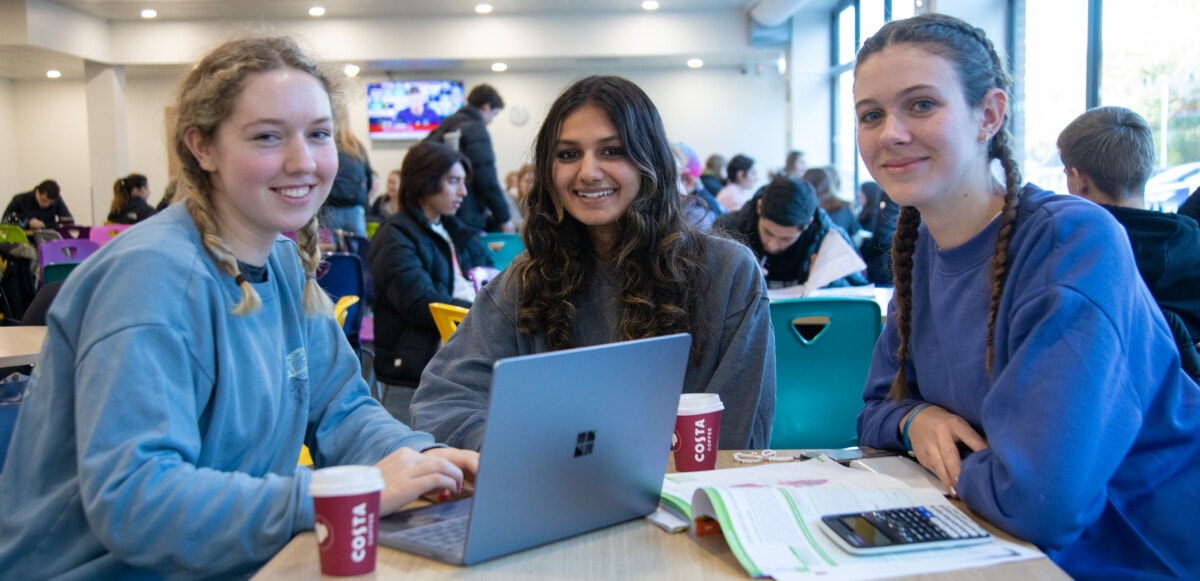IT Guide
Thinking about what IT you’ll need for College?

The College invests heavily in its IT services and equipment. We have over 900 computers, and 400 laptops, many of which are available in self-service lockers. However, we also recognise the benefits that students gain from having their own personal device, such as:
- Using a personal device allows students to customise settings, applications, and preferences according to their individual learning styles.
- Students can utilise electronic notetaking tools in every lesson, making it easier to organise, edit, and review notes.
- Students to access online resources, e-books, and educational apps, and carry out research in every lesson.
- Using a personal device ensures familiarity with the operating system, applications and files locations, creating a comfortable and efficient learning environment.
- Personal devices enable students to continue their learning outside the classroom, promoting self-directed study and research.
- In subjects that require specific software or applications, students can install and configure these on their personal devices in the exact way they need, allowing more flexibility and providing additional options for coursework.
- Students have 24/7 access to their course materials, making it easier to study, review, and prepare for assessments at any time.
Encouraging students to use their own devices contributes to a more dynamic and personalised learning experience, fostering digital literacy and adaptability in an increasingly technology-centric academic and professional landscape.
I want to buy a device, what should I buy?
Except for some subject specific requirements, the device you should buy really depends on your personal preference. In general, the device needs to allow you to complete basic tasks such as word processing, checking Microsoft Teams and email, as well as web browsing.
It’s worth considering whether you prefer taking notes by typing, or handwriting. If you prefer handwriting, then you may want to consider purchasing a tablet device that supports pen input and can run Microsoft OneNote. For example, a Microsoft Surface or iPad. This would also be useful for tasks such as sketching, drawing diagrams and annotating maps.
Detailed information about the subject specific requirements can be found at the bottom of this page.
The minimum specification we would recommend for a Windows laptop would be:
- Intel i5 or equivalent
- 16GB RAM
- 256GB SSD
- Built in webcam and microphone
I don’t have a mobile device, what’s available in College?
Within classrooms, workshops, and shared spaces like the Learning Resources Centre, we have an extensive network of over 1000 Windows 11 PCs. Each of these is equipped with Microsoft Office and subject-specific software necessary for various courses. Additionally, we provide the convenience of self-service lockers housing hundreds of laptops for short-term loans.
What software do I need?
The majority of software used by students at College is available for use on personal devices at no additional cost.
Software available for free while studying at the college includes:
- Microsoft Office 365 – this can be downloaded and installed on up to 5 devices.
- Adobe Creative Cloud (Photoshop, Premiere, Illustrator etc)
- SolidWorks
- Visual Studio
Software packages that would need to be purchased, include Apple Logic Pro X and Avid Sibelius. There are however free alternative products that subject teachers can recommend.
What technical support can the College offer?
The primary responsibility of the College IT Service team is to maintain and support the College’s infrastructure and network. While we endeavour to assist students with their personal equipment, it is important to note that such support will be provided on a ‘best-efforts’ basis and only when time allows.
Can I use my phone in College?
Smartphones can be a useful tool for providing basic access to Microsoft Teams, email, online resources and carrying out research during lessons, however they are not ideal for completing coursework or homework. The use of phones, and indeed any personal device in the classroom, is at the discretion of each individual teacher.
What about insurance?
Portable devices, such as laptop and tablets, come at a significant cost and are susceptible to being dropped, or misplaced. To safeguard your investment, we recommend verifying whether your household insurance includes coverage for personal devices outside the hose. If not, consider obtaining additional insurance.
Subject Specific Guidance
Maths & Further Maths – any tablet style device that allows handwriting input via pen that can run Microsoft OneNote. e.g. Apple iPad or Microsoft Surface.
Economics – any tablet style device that allows handwriting input via pen that can run Microsoft OneNote. e.g. Apple iPad or Microsoft Surface.
Physics – any tablet style device that allows handwriting input via pen that can run Microsoft OneNote. e.g. Apple iPad or Microsoft Surface.
Music Technology – ideally Apple Mac (Air or Pro) with Logic Pro X
Computer Science – ideally a Windows device capable of running Microsoft Visual Studio. https://learn.microsoft.com/en-us/visualstudio/releases/2022/system-requirements
Media/Film – high spec, capable of running Adobe Premiere Pro. 16GB RAM or more, 512GB storage or more. https://helpx.adobe.com/uk/premiere-pro/system-requirements.html
Photography – capable of running Adobe Photoshop. 16GB RAM or more, 512GB storage or more. https://helpx.adobe.com/uk/photoshop/system-requirements.html
3D Design, Graphics – Windows laptop capable of running Solidworks and the Adobe Suite. 16GB RAM or more.
https://www.solidworks.com/support/system-requirements
https://helpx.adobe.com/uk/photoshop/system-requirements.html